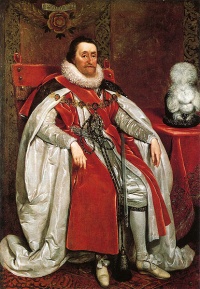King James I of England
From Textus Receptus
| Line 1: | Line 1: | ||
| - | + | [[Image:James I of England by Daniel Mytens.jpg|200px|thumb|right|King James I of England]] | |
| - | + | '''James VI & I''' (19 June [[1566 AD|1566]] – 27 March [[1625 AD|1625]]) was [[List of monarchs of Scotland|King of Scots]] as '''James VI''' from 24 July [[1567 AD|1567]]. On 24 March [[1603 AD|1603]], he also became [[List of English monarchs|King of England]] and [[Kingdom of Ireland|Ireland]] as '''James I''' when he inherited the English crown and thereby [[Union of the Crowns|united the Crowns]] of the Kingdoms of [[Kingdom of Scotland|Scotland]] and [[Kingdom of England|England]] (each country remained legally separate, with their own Parliaments, judiciary, coinage etc., though both ruled by James). James VI & I continued to hold both crowns until his death in 1625, but based himself in England (the larger of the two realms) from [[1603 AD|1603]]. | |
| - | + | He became King of Scotland when he was just thirteen months old, succeeding his mother [[Mary, Queen of Scots]], who had been compelled to [[Abdication|abdicate]] in his favour. Four different [[regent]]s governed during his minority, which ended officially in [[1578 AD|1578]], though he did not gain full control of his government until [[1581 AD|1581]].<sup>[]</sup> In 1603, he succeeded the last [[Tudor dynasty|Tudor]] monarch of England and Ireland, [[Elizabeth I of England|Elizabeth I]], who died without issue.<sup>[]</sup> He then ruled England, Scotland, and Ireland for 22 years, often using the title King of Great Britain, until his death at the age of 58.<sup>[]</sup> James, in line with other monarchs of England of the time, also claimed the title King of France, although he did not actually rule France. | |
| + | Under James, the "Golden Age" of [[Elizabethan era|Elizabethan]] literature and drama continued, with writers such as [[William Shakespeare]], [[John Donne]], [[Ben Jonson]], and Sir [[Francis Bacon]] contributing to a flourishing literary culture.<sup>[]</sup> James himself was a talented scholar, the author of works such as ''[[Daemonologie]]'' ([[1597 AD|1597]]), ''[[True Law of Free Monarchies]]'' ([[1598 AD|1598]]), and ''[[Basilikon Doron]]'' ([[1599 AD|1599]]).<sup>[]</sup> Sir [[Anthony Weldon]] claimed that James had been termed "the wisest fool in [[Christianity|Christendom]]", an epithet associated with his character ever since.<sup>[]</sup> | ||
==External Links== | ==External Links== | ||
Revision as of 07:28, 9 January 2011
James VI & I (19 June 1566 – 27 March 1625) was King of Scots as James VI from 24 July 1567. On 24 March 1603, he also became King of England and Ireland as James I when he inherited the English crown and thereby united the Crowns of the Kingdoms of Scotland and England (each country remained legally separate, with their own Parliaments, judiciary, coinage etc., though both ruled by James). James VI & I continued to hold both crowns until his death in 1625, but based himself in England (the larger of the two realms) from 1603.
He became King of Scotland when he was just thirteen months old, succeeding his mother Mary, Queen of Scots, who had been compelled to abdicate in his favour. Four different regents governed during his minority, which ended officially in 1578, though he did not gain full control of his government until 1581.[] In 1603, he succeeded the last Tudor monarch of England and Ireland, Elizabeth I, who died without issue.[] He then ruled England, Scotland, and Ireland for 22 years, often using the title King of Great Britain, until his death at the age of 58.[] James, in line with other monarchs of England of the time, also claimed the title King of France, although he did not actually rule France.
Under James, the "Golden Age" of Elizabethan literature and drama continued, with writers such as William Shakespeare, John Donne, Ben Jonson, and Sir Francis Bacon contributing to a flourishing literary culture.[] James himself was a talented scholar, the author of works such as Daemonologie (1597), True Law of Free Monarchies (1598), and Basilikon Doron (1599).[] Sir Anthony Weldon claimed that James had been termed "the wisest fool in Christendom", an epithet associated with his character ever since.[]
External Links
- King James Unjustly Accused
- King James VI & I Page
- The Real King James by Phil Stringer
- Wikipedia Article on King James I of England

